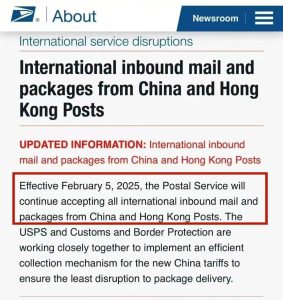On Wednesday, February 5, the United States Postal Service (USPS) announced the resumption of inbound mail and package acceptance from mainland China and Hong Kong. This decision came just a day after the agency had announced the suspension of these services on Tuesday evening, February 4.
In a notice published on its website, USPS explained that it is closely collaborating with U.S. Customs and Border Protection (CBP) to establish an effective collection mechanism for implementing new tariff policies, aiming to minimize disruptions to package deliveries.
This abrupt policy reversal occurred after U.S. President Donald Trump imposed an additional 10% tariff on Chinese goods last Saturday, as part of a new round of tariff actions targeting the country’s three major trading partners. Notably, on Monday, Trump agreed to delay by 30 days the planned imposition of a 25% tariff on Canada and Mexico.
As part of the new tariff policy, Trump also closed a long-standing trade “loophole”—the de minimis exemption—which had allowed exporters to ship packages valued under $800 to the U.S. duty-free. This change is expected to have a significant impact on Chinese cross-border e-commerce platforms such as Temu and Shein, as well as many other e-commerce businesses. These companies have gained rapid popularity in the U.S. market by offering low-cost clothing, furniture, and electronics.
According to CBP data, over 1.3 billion “de minimis” packages were processed last year. A 2023 report from the U.S. House of Representatives indicated that Temu and Shein may account for more than 30% of all “de minimis” packages imported into the U.S., with nearly half of all such packages from China originating from these two companies.
With the rise of e-commerce and the surge in low-cost package shipments, the U.S. Congress in 2016 raised the “de minimis” threshold from $200 to $800. However, critics argue that this trade “loophole” has facilitated the entry of illegal goods into the U.S. Trade officials have also pointed out that “de minimis” packages undergo less scrutiny, raising concerns about counterfeit and unsafe products.
Why did USPS reverse its decision so quickly? What new surprises does the Trump administration have in store? Let’s wait and see—only time will tell.

